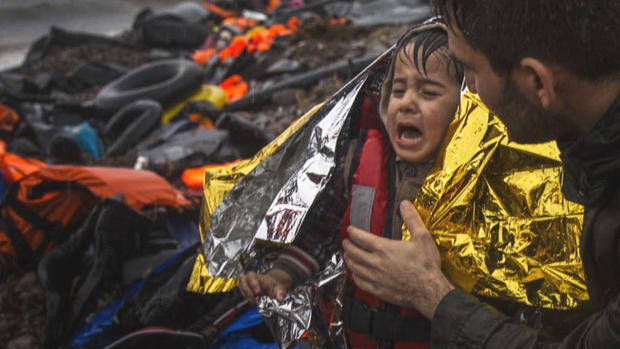Another door slammed shut in migrants' faces
TOVARNIK, Croatia -- With the most popular land route for migrants trying to reach the wealthy nations of Northern and Western Europe blocked earlier this week by Hungarian police wielding tear gas, batons and water cannon, the focal point has shifted to Croatia.
CBS News correspondent Mark Phillips, is on Croatia's border with Serbia, which Croatian authorities have also tried to seal.
Every time a door opens for the refugees, says Phillips, another one seems to slam shut. Croatia seemed like the route to salvation just a day earlier, but it's become another roadblock on the trail of despair.
The open-door policy of the Croatian government lasted just 24 hours. After an influx of what officials say has been more than 13,000 migrants in two days, the Croatians have shut the door. The tone from the highest levels of Croatia's government changed sharply Friday, with Prime Minister Zoran Milanovic saying his country could simply take no more.
"We cannot register and accommodate these people any longer," he said at a news conference. "They will get food, water and medical help, and then they can move on. The European Union must know that Croatia will not become a migrant 'hotspot'. We have hearts, but we also have heads."
Even for those who managed to get across, and those who are still arriving by trekking through cornfields to avoid the closed border checkpoints, chaos compounds the despair.
Busses -- not nearly enough busses -- have been brought in to take the migrants to reception camps. As the buses pulled up, people swarmed them.
One thing most of the refugee families here had managed to do in all their harrowing travels was to stay together. But on Thursday, many were split apart as police tried to get women and children first aboard the waiting buses.
Friday morning police were trying to restore order. The refugees were told to line up for busses, and that's what they've been doing -- thousands of them. Phillips said the line stretched back as far as he could see.
What the refugees struggle to see, as they stand in the line, is any future.
It took four hours for one bus to arrive. It barely made a dent in the line.
Asked by Phillips where he was hoping to get to, Sarmad, an Iraqi refugee waiting in the line, said he didn't even know.
"Any country that's safe for me," he told Phillips.
Secretary of State John Kerry touched down in London Friday morning for meetings with British and Arab officials on the grinding war in Syria. The conflict is one of the chief forces driving the largest influx of migrants Europe has seen since World War II.
Kerry is expected to meet with his British counterpart over the weekend and will likely discuss a new proposal from Russia for direct talks to seek a political solution to the war, which began as an uprising against Moscow's ally, Syrian President Bashar Assad.
Meanwhile, thousands of refugees continue to flee the war, most aiming for European soil.
The International Office for Migration said Friday that 473,887 people have crossed the Mediterranean to reach Europe this year alone, and almost 40 percent -- some 182,000 people -- came from Syria.
